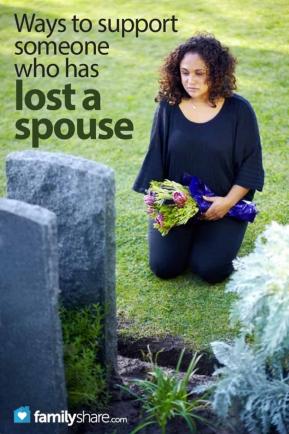
Rose* and her husband were on vacation in Alaska for the summer. They had arrived just six days before. She and her husband had been busy all day. Then, without warning, her husband said, "I'm tired. I think we should go to bed early."� He passed away in his sleep, leaving her in shock and thousands of miles away from home.
Losing a spouse is devastating. It brings pain and loneliness, but it also presents practical challenges that are difficult to prepare for. When someone we love has been recently widowed, we want to be able to help. However, we often don't know how. Here are some ways to reach out to widows and widowers in their times of need.
Sue had been suffering from an avalanche of challenges. Her husband was on hospice, the arthritis in her back became debilitating, her son was having marital problems, and her daughter was bedridden with a difficult pregnancy. Then, Sue's house burned down.
When Sue's husband passed, the cumulative effect of so many trials left her shocked and confused. She had a hard time thinking properly. Initially, it was a challenge simply to take care of her basic needs.
Sue says that when someone has lost a spouse, you need to be very practical and forward. Ask her direct questions to assess her immediate needs. How are you going to eat? Where will you sleep? Do you need transportation? Who will take care of your medical needs? Who will do your shopping? How will you take care of your lawn? Do you have someone to take care of your finances? Offer your help and enlist the help of others to make sure that her immediate needs are met.
Rose's brother helped her get through those initial frightening days. He made arrangements to fly her home and help transport the RV back home.
Sue's house was livable, but still damaged. Her bathroom was covered in soot, and she believed that it was inoperable. A friend came and cleaned the room top to bottom. Sue was relieved that she would still be able to use the bathroom, and not have to find an alternative.
When someone loses a spouse, they must learn how to take over responsibilities that had belonged to their spouse.
George* was no longer able to drive. He relied on his wife to take him to medical appointments, church and other activities. He appreciated the people who offered to drive him to the hospital to see his dying wife and who made sure he always had transportation once she passed. He was also grateful for the meals that people brought to him since his wife had been the main cook in their household.
When Ellen* lost her husband, she needed to learn how to operate the lawnmower and take care of yard maintenance.She also learned how to fix small appliances, check her car for fluids and wind her way through the confusion of getting car insurance. Although she eventually adjusted, learning to be responsible for car and household maintenancewas overwhelming in the beginning.
Finances can be challenging for people who have been recently widowed. Often times, a dying spouse's medical expenses can eat through retirement savings. It can be difficult for someone, who has not had to worry about finances, to learn how to be frugal.
Losing one's lifetime partner brings deep sadness and loneliness. Ellen was grateful for the people who gave her a shoulder to cry on and a hand to hold onto. Even more, she appreciated the people who were there "after the shouting was over."�
She says, "Immediately after your husband's death, everyone is there to console you. But once that wears off, you are still alone. Those people who still called or stopped by are wonderful."�
Rose found that keeping busy helped her through the grieving process. A friend in her neighborhood invited her to dinner. There she met a new friend who was so understanding and comforting that she made her feel like family. Her new friend spent time with her and found activities to help keep her busy.
After her husband passed, Sue moved in with her daughter to help with her pregnancy, the new baby and then a move. Being needed helped her through that time. She made a list of things to do, and that kept her busy. She says that the fact that her daughter needed her so much at that time was a godsend.
Many people who are newly widowed choose to relocate to be close to their children and grandchildren. They can use help in packing and moving. They may not have many friends in their new town. Reaching out and becoming friends with someone new can help them make the adjustment to their new place.
Holidays can be the most difficult time for a new widow or widower, especially if they are not close to family. Sue remembers contemplating spending the first Thanksgiving alone after her husband passed. People tend to be so engrossed in planning their own family celebrations that they fail to think of others. Thankfully, her son invited her to join him, and she was able to spend the day with him and her granddaughter.
When someone loses a spouse, words of comfort and condolences are always appreciated. However, it is important to remember that thoughtful actions speak louder than words.
*Names changed for privacy.

